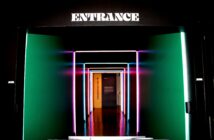
When my little boy was three months old, doctors told me he might have a deadly disease. When we checked into the hospital, I only brought enough clothes for the night. One night passed, then a week, then two, three… I still hadn’t left the hospital. Doctors said my son didn’t have the disease they initially thought, but couldn’t make a diagnosis. His three-week-long fever showed no sign of abating. Not a second went by that I didn’t pray to God. At the end of the third week, I decided to prepare myself for the worst…after all, fate is fate. The fourth week passed and I missed my 5 year-old daughter’s birthday celebration because we were still in the hospital. At the beginning of the fifth week, my son’s fever disappeared. Doctors were never able to make a diagnosis (there are millions of viruses and they can’t test for each one). Today my son is 3 years old and I feel blessed he is still here. I realize how fragile life is and know not to take anything for granted.
While I was in the hospital with my son, I heard babies crying constantly. Every time I walked in the hallways, I saw babies on their own. One day, I asked the nurse why these babies never had visitors. She told me most of them had been abandoned by their mothers, who were from war-torn Libya. It was the only safe place for them. At the hospital, they weren’t in a war zone or on the streets. They had food and shelter.
I could never imagine having to abandon my child, yet what other choice did these women have to save their children’s lives?
I started researching the war in Libya which eventually led me to Syria and the refugee crisis. The images were too terrifying to ignore. As I looked deeper, I found other people who wanted to do something about the refugee crisis. I saw a Facebook post from a biology student who wanted to act in a concrete way. A few other people joined the chat and the Facebook page Open Homes, Open Hearts US was created. On our page, we asked anyone willing to offer his/her home to a refugee to join our page and send us a message. Within a month, we had 3,000 people offering to host a refugee or a refugee family in their home. People even offered to pay for refugees to fly from Syria to the US. We created a petition asking the US government to consider increasing the number of Syrian refugees allowed in the US. We received media coverage in Newsweek, CNN, The Today show and many other outlets. As there is no hosting program based in the US, we raised funds for volunteers in Europe. We were able to fund eleven volunteer missions to Lesvos and the Balkans and sent a medical student from the US to Lesvos to help with emergency care for two weeks.
Still, it isn’t enough. I am a European citizen and this is happening in my backyard. There are hundreds of refugees on the streets of Paris and a few thousand in Calais. These women, men and children are like you and me. One day, it could be us.
I went to places like the Stalingrad metro and Gare de l’Est where I knew refugees were camping out. I befriended refugees from Syria, Sudan, Iraq, Afghanistan, Iran, Pakistan, Nepal, Ukraine. Through talking to them and other volunteers, I knew I needed to do something more than simply providing food, blankets and clothing.
After a few trips to Calais, some refugees, volunteers and I started a project called ESPERO. The idea is to help refugees integrate into French society through job training in agriculture. Many refugees have farming experience. But because many haven’t mastered French, they are lost and don’t know where or how to look for a job. ESPERO will provide French lessons, job training and opportunities in agriculture, production of finished goods and distribution. Many rural areas in France have become deserted. We would like to bring life and culture back to these villages through our community farms.
I believe in fate and I believe that sometimes we need to go through difficult situations in order to make us better people. Since my son was born, my life has changed. I know I need to do my part, even if it is very small, to make a difference.
“Nice people made the best Nazis. My mom grew up next to them. They got along, refused to make waves, looked the other way when things got ugly and focused on happier things than ‘politics. They were lovely people who turned their heads as their neighbors were dragged away. You know who weren’t nice people? Resisters.”
I will never be a nice person!



